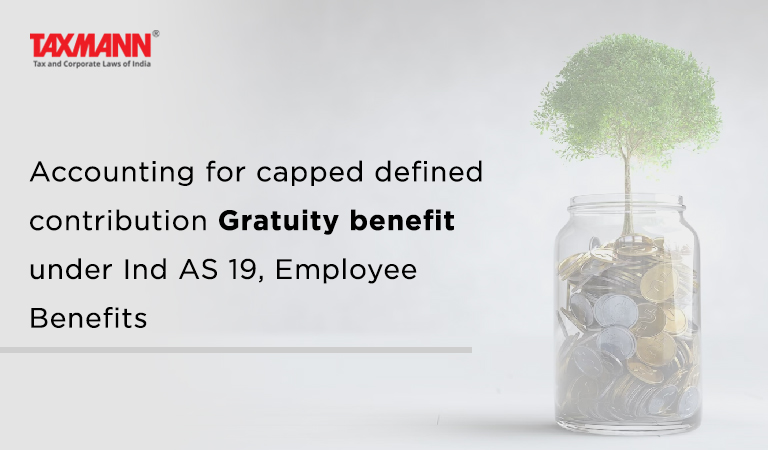Accounting for capped defined contribution Gratuity benefit under Ind AS 19, Employee Benefits
- Blog|News|Account & Audit|
- 2 Min Read
- By Taxmann
- |
- Last Updated on 24 February, 2023

Ind AS 19, Employee benefits, defines defined contribution plans are post-employment benefit plans under which an entity pays fixed contributions into a separate entity (a fund) and will have no legal or constructive obligation to pay further contributions if the fund does not hold sufficient assets to pay all employee benefits relating to employee service in the current and prior periods and defined benefit plans are post-employment benefit plans other than defined contribution plans. Here a company has gratuity policy, the benefit towards gratuity is governed by the Payment of Gratuity Act and is presently capped at Rs. 20 Lakh per employee. However, due to Government Regulations, company cannot contribute more than 30% of Base Pay (Basic + DA) towards benefits.
Here confusion arises for the purpose of accounting under Ind AS 19, whether company treat this as Defined Benefit plan or Defined contribution plan as the amount of contribution is capped by 30% of Base Pay.
The Expert Advisory Committee (EAC) of ICAI has noted that under defined benefit plans, the employer’s obligation is not limited to the amount that it agrees to contribute to the employee benefit funds; rather, employer is obliged to provide the agreed benefits to current and former employees. If actuarial or investment experience is worse than expected, the employer’s obligation is increased because the employer is in substance underwriting the actuarial and investment risks associated with the plan. Therefore, the expense recognised for a defined benefit plan is not necessarily the amount of contribution due for the period. The Committee notes that the cap is not on the post retirement benefit entitlement of the employees of the Company and the employees continue to be entitled to their benefits even after the extant DPE Guidelines. Therefore, the Company’s obligation towards gratuity is not restricted to the Company’s contributions and, therefore, should be continued to be classified as defined benefit plan. Accordingly company should continue to measure its obligations towards the gratuity benefits plans as defined benefit plan as per the requirements of para 57 and para 64 of Ind AS 19.
Click Here To Read The Full Story
Disclaimer: The content/information published on the website is only for general information of the user and shall not be construed as legal advice. While the Taxmann has exercised reasonable efforts to ensure the veracity of information/content published, Taxmann shall be under no liability in any manner whatsoever for incorrect information, if any.

Taxmann Publications has a dedicated in-house Research & Editorial Team. This team consists of a team of Chartered Accountants, Company Secretaries, and Lawyers. This team works under the guidance and supervision of editor-in-chief Mr Rakesh Bhargava.
The Research and Editorial Team is responsible for developing reliable and accurate content for the readers. The team follows the six-sigma approach to achieve the benchmark of zero error in its publications and research platforms. The team ensures that the following publication guidelines are thoroughly followed while developing the content:
- The statutory material is obtained only from the authorized and reliable sources
- All the latest developments in the judicial and legislative fields are covered
- Prepare the analytical write-ups on current, controversial, and important issues to help the readers to understand the concept and its implications
- Every content published by Taxmann is complete, accurate and lucid
- All evidence-based statements are supported with proper reference to Section, Circular No., Notification No. or citations
- The golden rules of grammar, style and consistency are thoroughly followed
- Font and size that’s easy to read and remain consistent across all imprint and digital publications are applied



 CA | CS | CMA
CA | CS | CMA
